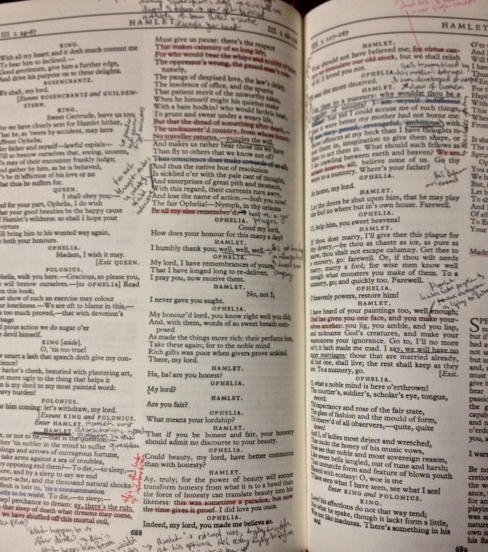“I saw that you changed Hamlet from an INTP to INTJ. I’m assuming there’s a reason for that?? Also, you said a lot of people type him as an INFP? Could you elaborate on why you’re against that? Could he perhaps be an INFJ?”
F vs T
Hamlet is the ultimate Elizabethan emo kid. He’s a teenager who suffers from an undiagnosed mental condition that affects his hormonal balance separately from his personality.
Inexperienced typers are often oblivious to the reality that depression is an illness, not a personality trait. As a result, most people assume that Hamlet is an F-type. However, one can be very logical (as Hamlet is) and yet have surging emotions as a result of depression.
My analysis of his Meyers-Briggs type is purely based off of the jungian functions (in proper hierarchy), in addition to a close reading of how his thought process works in contrast or correlation to his depression.
I observe a heavy amount of T in Hamlet that actually over-rules his F functions. He wants to kill himself, but doesn’t etc. With that in mind, I ruled out INFx. I knew he had to be an INTx, but I admit I confused his Fi for Fe and his Te for Ti at first, which is why I initially went for INTP.
J vs P
The main reason that I retyped him was that I got thinking more in depth about how his mental illness changes our view of his personality. It’s easy to look at someone with a given mental illness and instantly see P or J based on the traits that the illness entails.
For instance, it’s easy to look at an OCD person and instantly assume J, or to assume that anyone with ADHD must be a P type.
If you’re typing based off the four letters rather than the jungian functions, a manic depressant like Hamlet is easy to see as a P –particularly INFP. INFP is your stereotype bipolar, emo or depressed character. Everyone instantly assumes that people like Vincent Van Gogh (who was also bipolar) is an INFP without actually considering how his illness clashed with his personality.
The determining factor in this came from looking specifically at Hamlet’s extremes and comparing them to his calms. During his manic episodes, Hamlet is extremely indecisive, can’t settle down and doesn’t plan (easy to see as P). In his depressive episodes, he is unmotivated and indecisive (also easy to see as P).
However, at the very beginning and end of the play, we get to see a bit more of Hamlet in a stable mood. His uncle sends him away to recover, and when he comes back, Hamlet is extremely more calm than he was before. He’s perfectly tranquil in the face of death, and his only major emotional outburst comes when he finds out that Ophelia killed herself because of him.
However, in these brief periods, Hamlet is task oriented (Te) and and he thinks carefully through his decisions before firmly acting on them.

Fi vs Fe
Overall, I think the main thing to realize is that Hamlet’s feeling function is really easy to mistake as Fe simply because he’s so outwardly emotional in manic episodes –but once you realize that they’re manic episodes and that he’s not like that in depressive episodes or in normal mode, you realize that he uses Fi.
Unlike an Fe user, he’s in tune with his emotions –he understands them enough to consider suicide and decide against it out of logic. His emotions come out externally because when he’s in a manic episode, but during his depressive episodes he shuns the entire world and refuses to discuss his feelings with anyone but himself. In truth he focuses more on thinking than being emotional. The trick here is realizing that just because a person is emotional does not mean that they aren’t a thinker (and that’s where the majority of inexperienced types go wrong). Hamlet’s emotional bursts are a result of major bi-polar depression, not his personality.
He’s extremely introspective, constantly trying to understand himself on deeper and deeper levels. He only twice confesses his true emotions out loud (twice, and both times to the same person –his mother). All other times, he talks through his feelings with himself (Fi being expressed through Te). He mentions his feelings a lot out loud to others (and this is why people get confused), but he doesn’t do so directly. He does it through riddles, so that only he knows what he’s talking about. He needs to vent his feelings, but doesn’t trust anyone with them.
Hamlet doesn’t go to others to talk about his feelings –not even Horatio gets to hear about his feelings. He doesn’t ever go to external sources for the base of his morality. He asks himself.

Ti vs Te
The second deciding factor was the Te vs Ti. Like I said, unless in a depressive episode, Hamlet is task oriented. Depression tends to drain your energy, motivation and spirits so that you don’t want to do anything, and I can see this happening to Hamlet. When he’s not in a depressive episode, he’s quick to act and in his normal mode, he thinks carefully about his decisions.
He’s also pretty cutting with his mode of speech, which isn’t necessary for Te, but it’s definitely more common in Te than Ti. Te prefers direct, blunt speech, while Ti is more concerned with exactness. The difference is subtle, but there.
Lastly, Hamlet is a schemer. He doesn’t seek to talk through his disagreements with Claudius (TiFe), but rather seeks to dole out punishment through action (TeFi). INTPs seeking to punish someone tend to resort to methods that involve making the other person’s life chaos, while INTJs seeking to punish a person would rather device a precise strategy.
Ni vs Ne
The more I’ve analyzed Hamlet, the more I can see specific methods behind his madness, which on the outside only appear as wild and unpredictable. I think Hamlet doesn’t fully accept the reality of his father’s murder as told to him by the ghost right away (thus his sudden fall into intense depressive introspection right after the encounter) because he needs evidence to believe it (Te). He thinks and tries to reason through the whole thing (temporarily distracted by thoughts of suicide) and then devises a strategy to get the proof he needs: a play.
If that doesn’t seem like an NiTe strategy to you, I’d say you’re reading the play wrong. First of all, his means of getting evidence doesn’t involve directly confronting Claudius about the issue, but rather uses symbolism to try to get/observe a reaction out of him (NiSe).
Hamlet pretty much obsesses over the ideas he gets, and wants to follow them through until he can see in absolutes and finalities (NiTe). Whereas a depressed NeTi user might think of using a play to get evidence (Ne), he would quickly dismiss it for lack of desire to carry the plan out (Ti). Likewise, he wouldn’t necessarily need physical evidence TeSe to prove to him that Claudius had murdered his father.
Also, when Hamlet is going about setting up the play, his directions to the players are incredibly blunt and embody a very specific vision of how he wants it to turn out (NiTe).

Hamlet does have difficulty settling on one plan, but he definitely doesn’t aim for chaos the way an INTP would. He aims for precise results, and I don’t think his seeming indecisiveness is truly an inability to decide what to do –rather, it’s a lack of needed evidence/knowledge.
He doesn’t choose not to kill himself because he can’t pick whether he likes life or death better (TiNe). He chooses expressly because he doesn’t know with certainty what will happen to him after death (TeFi). Likewise, when he chooses not to kill Claudius, it isn’t indecisive at all. In fact, that was one of the most decisive decisions he made during the play –he chose not to kill Claudius purely because doing so would diverge from his end goal (Ni). His goal was revenge, and believing that killing a praying man would not send him to hell to be a poor revenge, Hamlet chose very specifically not to kill Claudius.
Hamlet plans everything before he does it (with a few exceptions) (NiTe). Before the closet scene, he specifically says that he plans to “speak daggers to [his mother.” Part of the reason that it takes him so long to act throughout the play is that he has to plan everything out and cover all the ethical exits (NiTeFi).

Under moments of intense stress, Hamlet does act out impulsively without thought to consequence (Inferior Se). Particularly when he kills Polonious, Hamlet is under intense emotional stress. He’s in the unique situation of bearing his feelings to his mother (Fi) whilst simultaneously trying to strategically break her down as well (NiTe). He’s also just come away from the stressful situation of choosing not to kill Polonious for NiFi reasons and in the moment, assumes that the King is behind the curtain (Se).
He was so focused on the King/Gertrude in that moment (Ni) that he didn’t stop to consider the possibility (Ne) that Polonious might be behind it.
There you go. That is my personal interpretation of the character…after intense obsession over the play for years…involving frequent re-watching of…all of the different versions of it I can get my hands on…as well as frequent readings of it.
This is my copy of Hamlet, and yes, I write in books. Get over it.



Which movie version is your favorite? Also, have you seen the Michael Fassbender version of Macbeth?
LikeLike
I’m always torn between Mel Gibson or David Tenant as Hamlet. And sad to say I haven’t yet seen the Michael Fassbender Macbeth.
LikeLike
Even though Hamlet is a fictional character, this went a long way to help me understand myself better. I’m a chick who consistently types as INTJ, and for me, reading Hamlet is like looking in an opposite-sex mirror (I too suffer from depression/anxiety/related mental health issues). At times, certain facets of my illness have made me question whether I’m a different type, but your explanations of how illness clashes with personality (hence the mental anguish) make so much sense.
I could read these posts all day. Sometimes I do…hehe.
LikeLike
Wow, you’re so cool.
LikeLike
Hamlet isn’t mentally ill.
LikeLike
That’s been up for debate for about 5 centuries
LikeLike